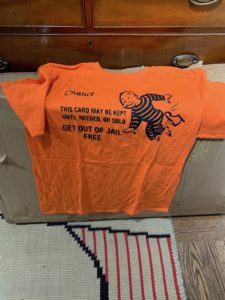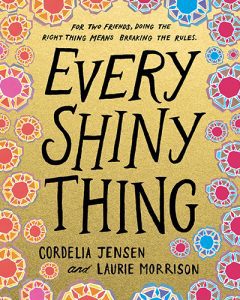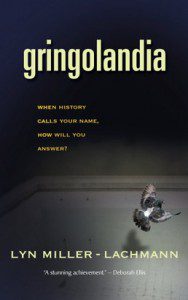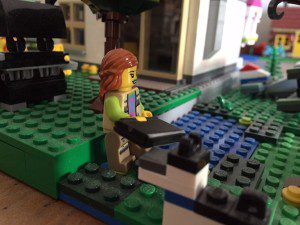Some Thoughts on the Publishing Crisis, Part IV: Surviving the Drought
I hope you’ve found the past three pieces in this series a valuable read and, in particular, the last one on taking action. The links in that third piece offer specific suggestions to confront book bans, from experts who spoke last April at the PEN World Voices Festival.

Agent Jacqui sent me this t-shirt after she helped to sell MOONWALKING, which ended my long forced publishing hiatus.
With this fourth blog piece, however, I consider myself the expert. As I’ve pointed out earlier, many of these trends — notably those related to demographics and the economy — are cyclical, and recovery is likely in the next few years. But what does a writer — one waiting for a first deal or hoping to stay in the industry after publishing one or more books — do in the meantime? This can also be an issue for writers in a genre that has temporarily fallen out of favor, as vampire novels did for about ten years, or who need to regroup after a book received negative or no reviews and/or suffered low sales. The latter happened to me in 2014-15, leading to more than five years when I couldn’t sell a single book and seven years between published books. Even before then, from 1990 to 2000, I stepped away from the YA space after a publisher withdrew a contract despite my manuscript receiving a prestigious work-in-progress award from SCBWI.
Taking a break from writing altogether may seem like a drastic move, but for some, it also may be the only way of preserving mental health and creativity. I wouldn’t look at it as quitting, because you can always go back, as I did. Walking away from the depressing cycle of hope and rejection freed me to pursue other interests. I worked as a librarian, reviewed for School Library Journal, compiled two reference books for librarians, and ultimately became editor of MultiCultural Review. My jobs made me very well-read. I was also able to devote more time and energy to raising my children, coaching their sports teams, and teaching Sunday school — all of which provided inspiration when I eventually did return to writing fiction for young people. At first, I looked at those ten years off as wasted time, since I also had to relearn the basics of writing fiction. And having been burned with a YA manuscript, I decided to try writing fiction for adult readers, at which point I noticed the same pattern I had when I originally started writing fiction — my most vivid characters were the young people. So after writing Dirt Cheap, which found a home with a small literary press, I returned to that award-winning YA manuscript that had lost the contract 17 years earlier and rewrote it, in the process changing it from a contemporary to a historical novel. That book, Gringolandia, appeared from the same small literary press in 2009 and went on to multiple awards and continued strong sales. Fourteen years later, I’m still getting decent royalty checks.
For many writers, taking time off is not an option. Some of us feel cranky and unfulfilled when we’re not writing. When I fell off the publishing ladder eight years ago, I didn’t want to step back entirely. I still had many stories in me that were bursting to get out, and more than two decades further on, I didn’t feel I had the time to spare. And with my children grown, my magazine shuttered in the 2008 recession, and a move to New York City that ended my Sunday school teaching, I didn’t have other options. I sometimes tell people I’m a full-time writer because I can’t do anything else.
I knew, though, that it would be years before I had another contract as a “re-debuted” author. A sales disaster usually calls for a big change in category/genre and a period in exile (or as I’ve called it, Author Jail). So I kept on writing, but I tried new things. I translated children’s books from Portuguese to English, which also inspired my own writing projects. I experimented with different points of view and forms, such as the verse novel. By the time I was ready to look for a new agent, I had two completed YA novels, another in progress, half a dozen picture books, and proposals and sample chapters for three middle grade novels. I was pleased with my inventory, its breadth, and the way I’d tried new things and learned from them. And while I naively believed that all of my inventory would quickly sell — for the most part, it’s “eyes forward” when things do start to sell — I was able to use elements from the failed projects in my new work. Sónia, the protagonist of my forthcoming YA verse novel Eyes Open, was a secondary character in my earlier manuscript THE HOUSE OF SILENCE, where she was best known for starting a Poetry Club to write verses honoring her boyfriend in prison. I incorporated elements from one of my rejected middle grade proposals to create the character of JJ in Moonwalking, the verse novel I wrote with Zetta Elliott.
 My collaboration with Zetta brings me to a third strategy for coping with the current crisis. Lean on your community. Taking classes and sharing work with other writers at all stages may be your key to breaking in or breaking back in after a long drought. I know of several anthologies where editors have drawn stories and essays from members of their critique groups. Co-authored works often bring together experienced authors and new ones. For instance, Laurie Morrison — now the author of multiple novels for older middle grade readers — got her start collaborating with verse-novel master Cordelia Jensen in Every Shiny Thing, which combines verse and prose in a dual-POV story. Laurie also has great advice on dealing with lean times.
My collaboration with Zetta brings me to a third strategy for coping with the current crisis. Lean on your community. Taking classes and sharing work with other writers at all stages may be your key to breaking in or breaking back in after a long drought. I know of several anthologies where editors have drawn stories and essays from members of their critique groups. Co-authored works often bring together experienced authors and new ones. For instance, Laurie Morrison — now the author of multiple novels for older middle grade readers — got her start collaborating with verse-novel master Cordelia Jensen in Every Shiny Thing, which combines verse and prose in a dual-POV story. Laurie also has great advice on dealing with lean times.
A final option for maintaining one’s writing and creativity during this publishing crisis is to go it alone. I seriously considered self-publishing, something Zetta has done successfully for many years. My plan was to start with two straightforward projects, a compilation of my most widely-read travel articles on Portugal that appeared on this blog over the years, and a reissue of my 2013 middle grade novel Rogue, which went out of print in 2017. I decided against it because self-publishing requires a wide range of skills — not only writing but also sourcing editors and cover designers, dealing with technology and distribution, and marketing. Marketing was my biggest hang-up. I’m one of those people who couldn’t sell lemonade in a desert. (Shhh, don’t tell any of my publishers this, though they probably know it already.) You probably have better marketing skills than I do, and if that’s the case, self-publishing may very well work for you. Many authors have made a lot of money from their self-published work, and writing quickly in genres underrepresented by mainstream publishers is key to success. If you’re one of those people who can’t stop writing no matter how dry things are in the publishing industry, and you can keep pouring that lemonade in the desert, self-publishing may be your way to go, both creatively and financially.
As with my other essays, I welcome comments and questions. Depending on what you want to discuss, this series may continue in the future. In any case, I thank you for reading and hope my thoughts have been helpful to you.









Super interesting, inspriring, and helpful, Lyn! Many thanks for all of your thoughts.
Thank you, Danielle! I hope the article helps writers.
I love this post Lyn! Even in your time away you were doing quite a bit of writing and building up your inventory — which I’m bolstered by. I’ve definitely hit one of these slumps this summer. I feel so discouraged by the entire process and industry. I honestly couldn’t write for months. My creative juices are flowing once again, but I still feel so fragile. Or… weak? It’s hard to keep believing when there’s not much to show for all your efforts. You know?
Thank you for sharing, Sabrina, though I’m sorry you’ve been struggling all summer. Even if you’re not writing, you’re subconsciously generating ideas. I think the important thing is not to beat yourself over a writing slump or block, or feel pressure with your new writing. It should be something enjoyable, whether or not it leads to paid publication. This blog is what sustained me for years. And I know someone else who keeps going by writing reviews. Just as we tell kids (or should tell kids) that any reading is good, any writing is good too.